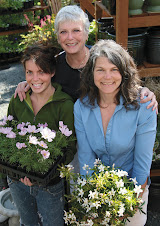GROWING FOOD
The Next Big Thing demands gardeners skip the petunias and plant some offbeat salad greens
Hold the hostas. And cancel the cannas.
A hot new trend is looming on the gardening front and, refreshingly, it doesn't revolve around foliage plants or in-your-face tropicals.
Quite simply, the Next Big Thing is going to be veggies. Lots and lots of veggies. Heirloom tomatoes, offbeat salad greens and stuff like that. All organically grown, of course. By us.
As concerns about the environment and chemicals used on food escalate, it's predicted that more people will decide to try cultivating a few edibles of their own. The trend toward "urban agriculture" is already big in Vancouver and Europe and has some staunch proponents in Toronto.
Gayla Trail is typical of the trend. Her feisty green-friendly website yougrowgirl.com promotes the message that "gardening is for the people" and that more urbanites should get involved.
"I'm very interested in urban agriculture because it makes sense," says Trail, fingering a pea vine growing on the roof of her Parkdale apartment. "Everyone's talking now about `buying local.' So, why not grow local, too?"
Trail says most vegetables are easy to grow (provided you have sun) and a surprising amount of them can be squeezed into a small space. They're also very decorative. On her hot, jam-packed rooftop, she cultivates everything from peas to hot peppers in containers and she has more planted in a nearby community garden.
An advocate of greening "all the empty lots and wasted spaces" in cities, this energetic young green thumb also recently helped get another community garden going in a downtown neighbourhood.
Trail is part of a movement that's swelling faster than a cucumber on phosphate fertilizer. In Vancouver, several corporations have vegetable gardens for employees to use on the roofs of their buildings. And in the U.K. (where gardening trends tend to start first), urban agriculture has become so hot that a recent issue of the Royal Horticultural Society's influential magazine The Garden was devoted entirely to vegetables, fruit and the controversy over pesticides used on food.
Growers are taking notice. Seed catalogues offer many compact varieties of vegetables that can be grown successfully in containers or small gardens.
Sales of vegetable seeds soared last year, outstripping those of flowers for the first time since the l950s.
Here in Toronto, the Toronto Botanical Garden has noticed a huge surge of interest in growing food, particularly among young people. And what everyone wants to get their hands on is exotic veggies from other countries.
"Our Japanese vegetable garden was our most visited garden last summer," says horticulturist Cathie Cox. "Everyone went straight to it. And they all wanted to know where to buy seeds of the Malabar spinach, because it was so colourful."
Demand was so great, in fact, the botanical garden started four flats of seedlings of this knock-out climbing spinach for its plant sale in May. They sold out in hours.
Trail professes a preference for colourful stuff, too.
"When you garden in a small space, you want plants that serve two purposes," she says. "They should look pretty. But if they're useful, too, that's a real bonus."
However, she thinks the biggest change taking place is in people's attitudes toward growing vegetables.
"It used be considered a low-class thing. Only immigrants did it," she says. "But, now, everyone I know wants to plant them."
Sonia Day is a writer, painter and master gardener based in Belwood, Ont. Contact her through soniaday.com.
http://www.thestar.com/article/232034






No comments:
Post a Comment